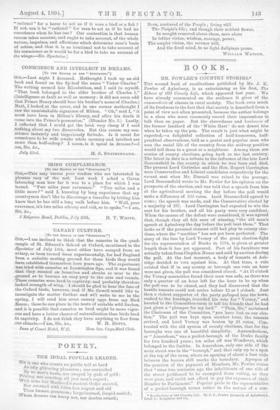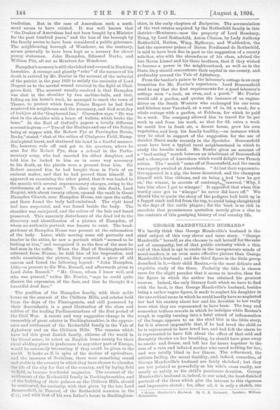BOOKS.
MR. FOWLER'S COUNTRY STORIES.* THE second book of recollections published by Mr. J. K. Fowler of Aylesbury, is as entertaining as his first, The Echoes of Old County Life, which appeared last year. We have already commented on the evidence it gives of the camaraderie of classes in rural society. The book owes much of its freshness to the fact that that society is described from a point of view not often presented, because the author belongs to a class who more commonly record their impressions in talk than on paper. But the shrewdness and bonhomie of the former landlord of the White Hart' do not desert him when he takes up the pen. The result is just what might be expected,—a delightful collection of half-humorous, half. practical observations, told as a genial and popular man who sees the social life of the country from the midway position would tell them to a guest or a neighbour. Among them are stories of county elections, going back to the last century. The latest in date is a tribute to the influence of the late Lord Beaconsfield in the county in which he was born and died. The present Lord Cottesloe and the Hon. Rupert Carrington. were Conservative and Liberal candidates respectively for the vacant seat when Mr. Disraeli was raised to the peerage. Lord Beaconsfield wrote to Mr. Fowler for his opinion on the prospects of the election, and was told that a speech from him at the agricultural meeting the day before the poll would make a difference of 300 votes. Lord Beaconsfield agreed to come ; the speech was made, and the Conservative elected by a majority of 187. Lord Carrington had expected to win the seat for his brother, and all his party were very confident. When the causes of the defeat were considered, it was agreed that, though they all felt sure of winning, "the old man's speech at Aylesbury the day before the poll beat them." That looks as if the personal element still had play in county elec- tions, where the "machine" has not yet been perfected. The story of the loss by Lord Verney of the great election-fight for the representation of Bucks in 1784, is given at greater length than it has yet appeared. Part of his furniture was actually taken from Claydon House and sold by auction during the poll. At the last moment, a body of tenants at Ash- ridge decided to vote against him. At that time, a rule existed that if in any county or borough one vote an hour were not given, the poll was considered closed. "At 11 o'clock the Verney committee found their man was safe, as there was only a quarter of an hour left for the hour to be up when the poll was to be closed, and they had discovered that the hostile tenants could not arrive before 12 or 1 o'clock. Just then a violent supporter of the party galloped into the town, rushed to the hustings, recorded his vote for "Verney," and hurried to the Committee-room to tell his friends that he had just given a "plumper for my lord." "Then, Sir," exclaimed the Chairman of the Committee, "you have lost us our elec- tion." The poll was kept open another hour, the tenants arrived, and Lord Verney was beaten by 24 votes. Con- trasted with the old system of county elections, that for the boroughs was one of beautiful simplicity. Agmondesham, or " Amersbam," was a pocket-borough of the Drake family for two hundred years ; ten miles off was Wendover, which belonged to the Smiths. In Amersham, only one side of the main street was in the "borough," and that only up to a spot at the top of the town, where an opening of about a foot wide between the houses still marks the boundary. Apropos of the question of the payment of Members, Mr. Fowler states that " seMie two centuries ago the inhabitants of one side of the street petitioned to be exempted from voting, as they were poor, and could not afford to pay the expenses of their Member to Parliament." Popular pride in the representative of a pocket-borough seems rather in the nature of a con- • ItrooTiections of Old Country Life. By a. K. Eowler (formerly of Aylesbury). Load a Lougmaus and Co.
tradiction. But in the ease of Amersham such a senti- ment seems to have existed. It was well known that "the Drakes of Amersham had not been bought by a Minister for the past hundred years," and the loss of the borough by the family seems to have been considered a public grievance. The neighbouring borough of Wendover, on the contrary, seems generally to have been kept as a nursery for clever young statesmen. John Hampden, Edmund Burke, and William Pitt, all sat as Members for Wendover.
Hampden's memory is still cherished and revered in Bucking- hamshire. A strange and ghastly "echo" of the manner of his death is revived by Mr. Fowler in the account of the nnburial of the patriot in the year 1828 to satisfy the curiosity of Lord Nugent as to the mortal wound received in the fight at Chal- grove field. The account usually received is that Hampden was shot in the shoulder by two carbine-balls, and that, falling on his horse's neck, he managed to reach the town of Theme, to protect which from Prince Rupert he had first mustered his neighbours and the yeomanry, and died next day of lockjaw at the 'Greyhound Inn.' Clarendon says, "He was shot in the shoulder with a brace of bullets, which broke the bone." In the Earl of Oxford's papers a totally different account is given :—" Two of the Hanleys and one of the Foleys being at supper with Sir Robert Pye at Farringdon House, Berke," stated "that at the action of Chalgrove Field, Hump- den's pistol burst, and shattered his hand in a fearful manner. He, however, rode off and got to his quarters, where he sent for Sir Robert Pye, then a colonel in the Parlia- mentary army, who had married his eldest daughter, and told him he looked to him as in some way accessory to his death, as the pistols were a present from him. Sir Robert assured him he had bought them in Paris of an eminent maker, and that he had proved them himself. It appeared on examining the other pistol, that it was loaded to the muzzle with several supernumerary charges, owing to the carelessness of a servant." To clear up this doubt, Lord Nugent, with about twenty others, opened the vault in Great Hampden Church, near Hampden House, cut open the coffin, and there found the body half-embalmed. The right hand had been amputated, and was found beside the body. The shoulder was uninjured, and the colour of the hair and beard preserved. This unseemly disturbance of the dead led to the discovery and identification of a picture of Hampden, of whom no authentic portrait was known to exist. The head- gardener at Hampden House was present at the exhumation of the body. Later, while moving some old portraits and lumber in the attics, he saw a portrait which "seemed to be looking at him," and recognised it as the face of the man he had seen in the coffin. When the Earl of Buckinghamshire returned from France, he told him of his impression, and while examining the picture, they removed a piece of old canvas and found the following legend : "John Hampden, 1640,—a present to Sir Wm. Russell, and afterwards given to Lord John Russell." "Mr. Grace, whom I knew well, and who was present," writes Mr. Fowler, "says he could quite discern the expression of the face, and that he thought it a beautiful dead face."
The position of the Hampden family, with their noble house on the summit of the Chiltern Hills, and estates held from the days of the Plantagenets, and still possessed by their descendants, is a good illustration of the class and calibre of the leading Parliamentarians of the first period of the Civil War. A recent and very suggestive change in the ownership of great estates in Buckinghamshire, is the appear. once and settlement of the Rothschild family in the Vale of Aylesbury and on the Chiltern Hills. The reasons which have led this great Jewish family, citizens of the world in the literal sense, to select an English home county for their rural abiding-place in preference to any other part of Europe, would be extremely interesting if they could be given to the world. It looks as if, in spite of the decline of agriculture, and the increase of Socialism, there were something sound and stable in the country in which they have chosen to abandon the life of the city fur that of the country, and by laying field to field, to become territorial magnates. The account of the settlement of the Rothschild family in Buckinghamshire, and cf the building of their palaces on the Chiltern Hills, should be contrasted, for curiosity, with that given by the late Lord Beaconsfield, in Tanered, of the Rothschild mansion in the C.ty, and with that of his own father's house in Buolinghata.
shire, in the early chapters of Earlymion. The accumulation of the vast estates acquired by the Rothschild family in this district—Mentmore—now the property of Lord Roseberye Tring, by Lord Rothschild, Aston Clinton, by Lady Anthony Rothschild, Hatton, Wing, Egthorpe, and Waddesdon, the last the enormous palace of Baron Ferdinand de Rothschild, is said to have been due in part to the suggestion of a county, solicitor, who with the shrewdness of his class, advised the late Baron Lionel and his three brothers, that if they wished to become a power in the neighbourhood, as well as in the State, they should concentrate their capital in one county, and preferably around the Vale of Aylesbury.
From the banker's palace to the labourer's cottage is an easy, transition for Mr. Fowler's experience. Lord Beaconsfield. used to say that the first requirements for a good labourer're cottage were "a tank, an oven, and a porch." Mr. Fowler would add a garden, and quotes the instance of an engine. driver on the South Western who exchanged his one room and kitchen near Vauxhall, at a rent of 5s. 6d. a week, for a whole cottage with a garden, at Feltbam, for which he paid 58. a week. The company allowed him to travel for is. per week to and from his work, so that for 6d. extra a week he could live in fresh air, a decent house, grow his own vegetables, and keep his family healthy,—an instance which may be cited in support of the suggestion for the use of derelict Essex made recently in the Spectator. Beaconsfield must have been a typical rural neighbourhood in which to study the bucolic mind. Mr. Fowler gives an account of "beef-eating" match between an inhabitant of Beaconsfield and a champion of Amersham which would delight our French critics. The " etch " came off at Beaconsfield, and the result was eagerly awaited at Amereham. "At last their representa- tive appeared in a gig, the horse decorated, and the champion himself with blue ribbons, and on being led how he got on,' the winner, in accents of contempt„?2?eswered, 'Why, I hate him afore I got to winegar.' It appea.ied that when this worthy once got to winegar ' he never did leave off." We should like to quote the story of the pedigree bull built up in a faggot stack and fed from the top, to avoid being slaughtered iu the days of the cattle plague ; for the book is so rich in anecdote that promiscuous quotation merely gives a clue to the contents of this gossiping history of real country life.



































 Previous page
Previous page